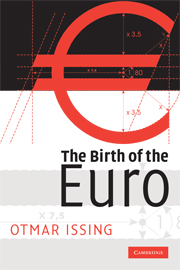Preface
Published online by Cambridge University Press: 29 May 2010
Summary
The date 1 January 1999 marks a milestone in monetary history. Eleven national currencies – not least among them the D-Mark, held in such high esteem by the citizens of Germany – ceased to exist. Their place was taken by the euro, as the single currency for over 300 million people. In the meantime, the euro area has grown, and now encompasses a total of fifteen countries.
The birth of the euro is a unique event. Never before had sovereign states ceded their responsibility for monetary policy to a supranational institution. This constellation – on one side, a central bank (the European Central Bank, ECB) and a single monetary policy; on the other, nation states that largely retain their competencies in the areas of economic and fiscal policy – creates a particular kind of tension in the interrelationship. Quite a few observers, with probably the majority of economists to the fore, were more than sceptical as to the outcome of this experiment. To begin with, will the euro get off to a good start? Under the prevailing circumstances, how likely is it, if at all, that the euro can be a stable currency? And then: what about the future? Can European monetary union (EMU) survive in the absence of political union?
The subject has been comprehensively addressed both by economists and in the media. Since well before the start of EMU, and even more so afterwards, there has been a vast output of economic research.
- Type
- Chapter
- Information
- The Birth of the Euro , pp. xi - xivPublisher: Cambridge University PressPrint publication year: 2008



